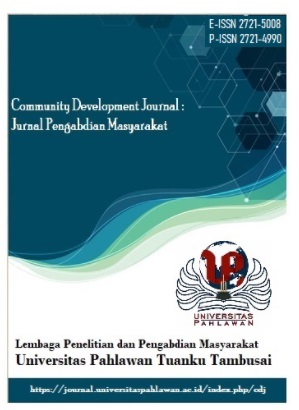NEW HORIZONS IN VOCABULARY ACQUISITION: EXPLORING THE ROLE OF ARTIFICIAL INTELLIGENCE IN ENGLISH LANGUAGE LEARNING APPS
DOI:
https://doi.org/10.31004/jrpp.v6i3.19497Keywords:
Pemerolehan Kosakata; Bahasa Inggris; Aplikasi Pengajaran Dan Pembelajaran Bahasa Inggris, Kecerdasan BuatanAbstract
Artikel literatur ini menggali ranah inovatif dari aplikasi pembelajaran bahasa Inggris, yang secara khusus berfokus pada dampak transformatif Kecerdasan Buatan (AI) dalam akuisisi kosakata. Di era di mana teknologi dengan cepat membentuk kembali pendidikan, penelitian ini menyelidiki hasil integrasi AI dalam aplikasi pembelajaran bahasa, memberikan wawasan tentang kemanjuran, keuntungan, dan masa depan akuisisi/pemerolehan bahasa.References
Al-Jifri, A. A. (2017). The impact of video games in the acquisition of English language: The case of Saudi youths. Journal of Foreign Language Education and Technology, 2(2), 15-35.
Azar, A. S., & Tan, N. H. I. (2020). The application of ICT techs (mobile-assisted language learning, gamification, and virtual reality) in teaching English for secondary school students in Malaysia during covid-19 pandemic. Universal Journal of Educational Research, 8(11C), 55-63.
Bailey, D. (2019). Chatbots as conversational agents in the context of language learning. Proceedings of the fourth industrial revolution and education, 32-41.
Belda-Medina, J., & Calvo-Ferrer, J. R. (2022). Using chatbots as AI conversational partners in language learning. Applied Sciences, 12(17), 8427.
Fauziningrum, E., Sari, M. N., Rahmani, S. F., Riztya, R., Syafruni, S., & Purba, P. M. (2023). Strategies Used by English Teachers in Teaching Vocabulary. Journal on Education, 6(1), 674-679.
Fitria, T. N. (2021). The use technology based on artificial intelligence in English teaching and learning. ELT Echo: The Journal of English Language Teaching in Foreign Language Context, 6(2), 213-223.
Kay?mba??o?lu, D., Oktekin, B., & Hac?, H. (2016). Integration of gamification technology in education. Procedia Computer Science, 102, 668-676.
Lee, C. H., Gobir, N., Gurn, A., & Soep, E. (2022). In the black mirror: Youth investigations into artificial intelligence. ACM Transactions on Computing Education, 22(3), 1-25.
Li, Y., & Hafner, C. A. (2022). Mobile-assisted vocabulary learning: Investigating receptive and productive vocabulary knowledge of Chinese EFL learners. ReCALL, 34(1), 66-80.
Maftoon, P., Hamidi, H., & Sarem, S. N. (2015). The effects of CALL on vocabulary learning: A case of Iranian intermediate EFL learners. BRAIN. Broad Research in Artificial Intelligence and Neuroscience, 3(4), 19-30.
Ningsih, P. E. A., & Sari, M. N. (2021). Are Learning Media Effective in English Online Learning?: The Students' and Teachers' Perceptions. Tarbawi: Jurnal Ilmu Pendidikan, 17(2), 173-183.
Rusmiyanto, R., Huriati, N., Fitriani, N., Tyas, N. K., Rofi’i, A., & Sari, M. N. (2023). The Role of Artificial Intelligence (AI) In Developing English Language Learner's Communication Skills. Journal on Education, 6(1), 750-757.
Sari, M. N. (2021). Shaping Young Learners’character Through Teacher Questioning In English Classroom Activities. Pendekar: Jurnal Pendidikan Berkarakter, 4(1), 14-19.
Sari, M. N. (2022). Teachers’ Perceptions On Students’ Learning Styles On Learning English At SMA Negeri 10 Kerinci. Jurnal Pendidikan, Keguruan, dan Pengajaran, 1(1), 32-43.
Sari, M. N., & Ningsih, P. E. A. (2022). An Analysis Of Students’motivation And Anxiety On Learning English At Sma Negeri 6 Kerinci. Pendekar: Jurnal Pendidikan Berkarakter, 5(3), 181-188.
Sari, M. N., Ningsih, P. E. A., & Novita, A. (2023). An Analysis of English Classroom Interaction Pattern at Eleventh Grade of SMKN 4 Kerinci Based On El Hanafi Theory. Jurnal Sosial Humaniora Sigli, 6(1), 105-115.
Wang, F. L., Zhang, R., Zou, D., Au, O. T. S., Xie, H., & Wong, L. P. (2021). A review of vocabulary learning applications: From the aspects of cognitive approaches, multimedia input, learning materials, and game elements. Knowledge Management & E-Learning, 13(3), 250-272.
Williams, R., Ali, S., Devasia, N., DiPaola, D., Hong, J., Kaputsos, S. P., ... & Breazeal, C. (2022). AI+ ethics curricula for middle school youth: Lessons learned from three project-based curricula. International Journal of Artificial Intelligence in Education, 1-59.
Wulantari, N. P., Rachman, A., Sari, M. N., Uktolseja, L. J., & Rofi'i, A. (2023). The Role Of Gamification In English Language Teaching: A Literature Review. Journal on Education, 6(1), 2847-2856.
Downloads
Published
How to Cite
Issue
Section
License
Copyright (c) 2023 Henny Merizawati

This work is licensed under a Creative Commons Attribution-ShareAlike 4.0 International License.






